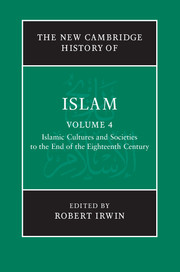Book contents
- Frontmatter
- Introduction
- PART I RELIGION AND LAW
- PART II SOCIETIES, POLITICS AND ECONOMICS
- 7 Legitimacy and political organisation: caliphs, kings and regimes
- 8 The city and the nomad
- 9 Rural life and economy until 1800
- 10 Demography and migration
- 11 The mechanisms of commerce
- 12 Women, gender and sexuality
- PART III LITERATURE
- PART IV LEARNING, ARTS AND CULTURE
- Glossary
- Bibliography
- Index
- References
7 - Legitimacy and political organisation: caliphs, kings and regimes
from PART II - SOCIETIES, POLITICS AND ECONOMICS
Published online by Cambridge University Press: 28 March 2011
- Frontmatter
- Introduction
- PART I RELIGION AND LAW
- PART II SOCIETIES, POLITICS AND ECONOMICS
- 7 Legitimacy and political organisation: caliphs, kings and regimes
- 8 The city and the nomad
- 9 Rural life and economy until 1800
- 10 Demography and migration
- 11 The mechanisms of commerce
- 12 Women, gender and sexuality
- PART III LITERATURE
- PART IV LEARNING, ARTS AND CULTURE
- Glossary
- Bibliography
- Index
- References
Summary
Although the Qurʾān frequently enjoins obedience to God and His Prophet, in verses generally recognised as belonging to the period of Medina, and formulates a powerful concept, jihād, for the revolutionary struggle against the Meccan oligarchy to establish Islam, it says nothing about the form of government under the Prophet or after his death. There is, however, an implicit model of dynastic rule in the house of the earlier prophets who were also explicitly designated as kings, most notably the houses of Abraham, David and ʿUmrān (Moses and Aaron). The fact that no male offspring survived Muḥammad precluded the institutionalisation of that model, which was, however, espoused by ʿAlῑ as the leading descendants of Hāshim, and after his assassination by his son al-Ḥasan, seconded by his cousin ʿAbd Allāh ibn al-ʿAbbās.
Our oldest historical document, the so-called ‘Constitution of Medina’, did provide a basis for the organisation of authority in the nascent Islamic polity. It in fact consists of a number of pacts with the Jews of Medina that mark the foundation of a ‘single community’ (umma wāḥida) under God, which was unified in matters of common defence and undivided peace, recognised Muḥammad as His Messenger, and invested him with judiciary authority. Nevertheless, as with the Qurʾān itself, no provisions were made regarding the form of government. Muḥammad’s political activities centred on the organisation of jihād.
- Type
- Chapter
- Information
- The New Cambridge History of Islam , pp. 223 - 273Publisher: Cambridge University PressPrint publication year: 2010
References
- 1
- Cited by



